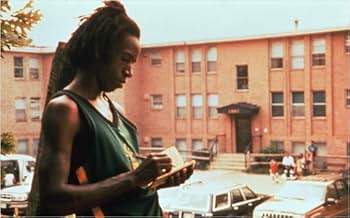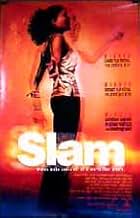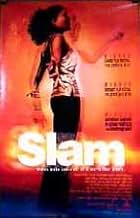IMDb RATING
7.0/10
2.5K
YOUR RATING
Grand Jury Prize, 1998 Sundance Film Festival. A talented youth (Saul Williams) copes with urban crime and despair by competing in poetry slams. Sonja Sohn of "The Wire" costars.Grand Jury Prize, 1998 Sundance Film Festival. A talented youth (Saul Williams) copes with urban crime and despair by competing in poetry slams. Sonja Sohn of "The Wire" costars.Grand Jury Prize, 1998 Sundance Film Festival. A talented youth (Saul Williams) copes with urban crime and despair by competing in poetry slams. Sonja Sohn of "The Wire" costars.
- Awards
- 4 wins & 3 nominations
Rhozier Brown
- Public Defender
- (as Rhozier T. Brown)
Storyline
Did you know
- TriviaThe production team had only one week to shoot all the prison scenes.
- GoofsWhen Ray is on his way to the poetry night, he gets on the metro at the Cleveland Park station, rides, and gets off at the metro at the same station: Cleveland Park.
- Quotes
Ray Joshua: The wind is the moon's imagination wandering. It seeps through cracks, ripples the grass, explores the unknown. My love is my soul's imagination. How do I love you? Imagine.
Featured review
In Marc Levin's Slam, perhaps the greatest asset he and cinematographer Mark Benjamin bring is the documentary-style to this urban-based drama. For the first few minutes of the film, I thought this would be a documentary. In a sense, when I realized when it wasn't it was a letdown, because even though this is a close-to-life depiction story of a kid in the ghettos of Washington DC, somehow if it really was a documentary it might've been even more compelling. As it is, Slam is a very naturalistic first-person drama, and the film deals with a protagonist that isn't hard to identify with, even when things seem a little over-done or even when it's a little naïve.
Basic story in two sentences Raymond Joshua (Saul Williams, also one of the film's co-writers) is set up to go to prison for pot, and while in prison he meets a few people that recognize his skills as a writer and poet.
When he gets out he wants to hold on to the freedom he knows he can attain, but he doesn't know how. With this conflict, Raymond is a character that is recognizable and identifiable with the audience. And with this, Williams creates a constantly believable performance even when his character may not sound entirely believable or realistic.
Although the performances are a plus for the film's success, such as Bonz Malone as Hopha, and Sonja Sohn as the writing teacher/poet Lauren, for me the style over-passed the substance. Though the poetry was inspired and the poets in the film who spoke them were very good, some of the story elements were not as effective as they could've been. For example, there's a blind-men analogy when Raymond gets out of jail and sees that his pot-dealer friend, who got shot, is now blind. Raymond is morally in the right in their final scene together, but it's a little too thick of a message for my taste when Raymond says, 'I once was blind too, now I can see.' Williams' poetry (which I assume he wrote himself) is interesting, although it's his delivery that catches my ear over the content. In a pivotal scene his poetry saves him from a beating in the prison yard, yet somehow it doesn't feel as real as some of the other scenes, like with him and Malone's character.
As I said, the style was what held the film, especially for such a low budget. I loved the use of the hand-held, shaky mis-en-scene, as though someone was allowed to peek into the atmosphere of DC. And from a psychological standpoint, Levin seems to extract what the essence is of Raymond and his neighborhood. Through his usage grainy color and then to a 8mm camcorder for flashbacks from Raymond, I felt the emotional impact that Levin was going for, the mix of disorientation and of being in a free-fallin' kind of society where you don't know what can happen next. I just wished that I saw more of that with the characters and the story. Cool ending though. B
Basic story in two sentences Raymond Joshua (Saul Williams, also one of the film's co-writers) is set up to go to prison for pot, and while in prison he meets a few people that recognize his skills as a writer and poet.
When he gets out he wants to hold on to the freedom he knows he can attain, but he doesn't know how. With this conflict, Raymond is a character that is recognizable and identifiable with the audience. And with this, Williams creates a constantly believable performance even when his character may not sound entirely believable or realistic.
Although the performances are a plus for the film's success, such as Bonz Malone as Hopha, and Sonja Sohn as the writing teacher/poet Lauren, for me the style over-passed the substance. Though the poetry was inspired and the poets in the film who spoke them were very good, some of the story elements were not as effective as they could've been. For example, there's a blind-men analogy when Raymond gets out of jail and sees that his pot-dealer friend, who got shot, is now blind. Raymond is morally in the right in their final scene together, but it's a little too thick of a message for my taste when Raymond says, 'I once was blind too, now I can see.' Williams' poetry (which I assume he wrote himself) is interesting, although it's his delivery that catches my ear over the content. In a pivotal scene his poetry saves him from a beating in the prison yard, yet somehow it doesn't feel as real as some of the other scenes, like with him and Malone's character.
As I said, the style was what held the film, especially for such a low budget. I loved the use of the hand-held, shaky mis-en-scene, as though someone was allowed to peek into the atmosphere of DC. And from a psychological standpoint, Levin seems to extract what the essence is of Raymond and his neighborhood. Through his usage grainy color and then to a 8mm camcorder for flashbacks from Raymond, I felt the emotional impact that Levin was going for, the mix of disorientation and of being in a free-fallin' kind of society where you don't know what can happen next. I just wished that I saw more of that with the characters and the story. Cool ending though. B
- Quinoa1984
- Jun 13, 2004
- Permalink
- How long is Slam?Powered by Alexa
Details
Box office
- Budget
- $1,000,000 (estimated)
- Gross US & Canada
- $1,009,819
- Gross worldwide
- $1,009,819
- Runtime1 hour 40 minutes
- Color
- Sound mix
- Aspect ratio
- 1.85 : 1
Contribute to this page
Suggest an edit or add missing content






























